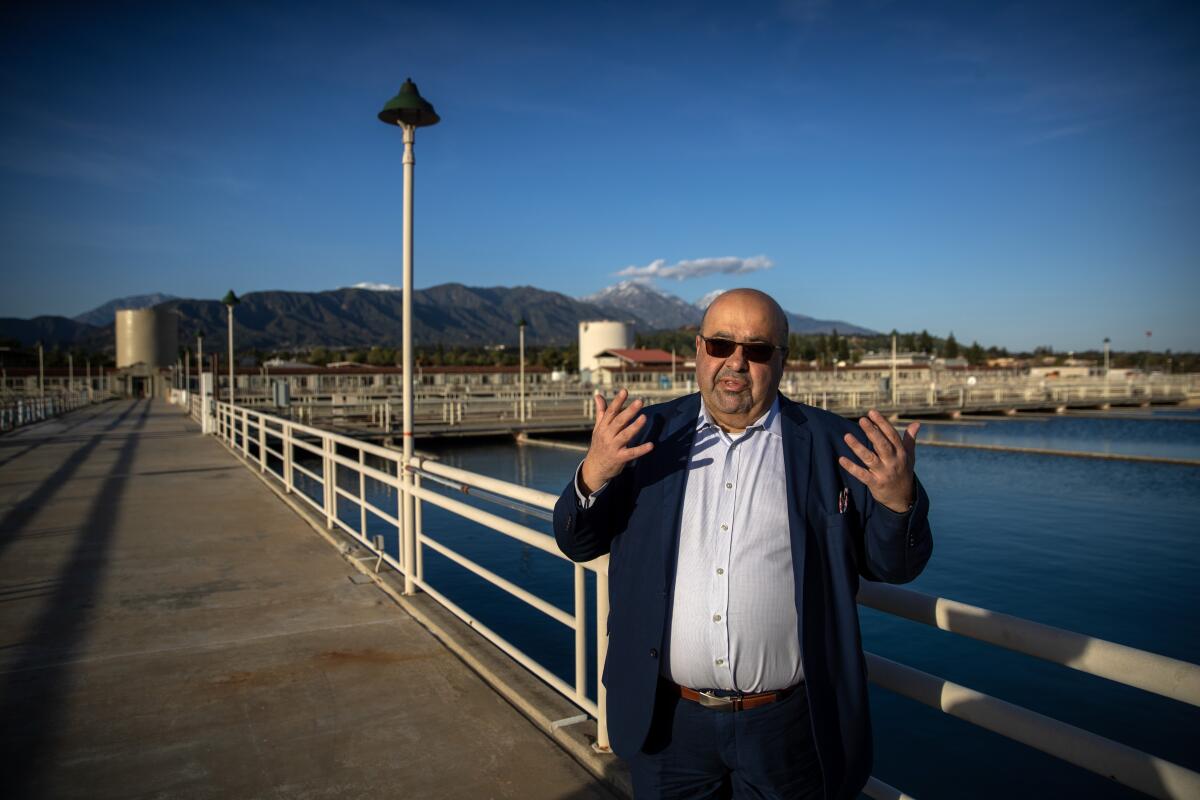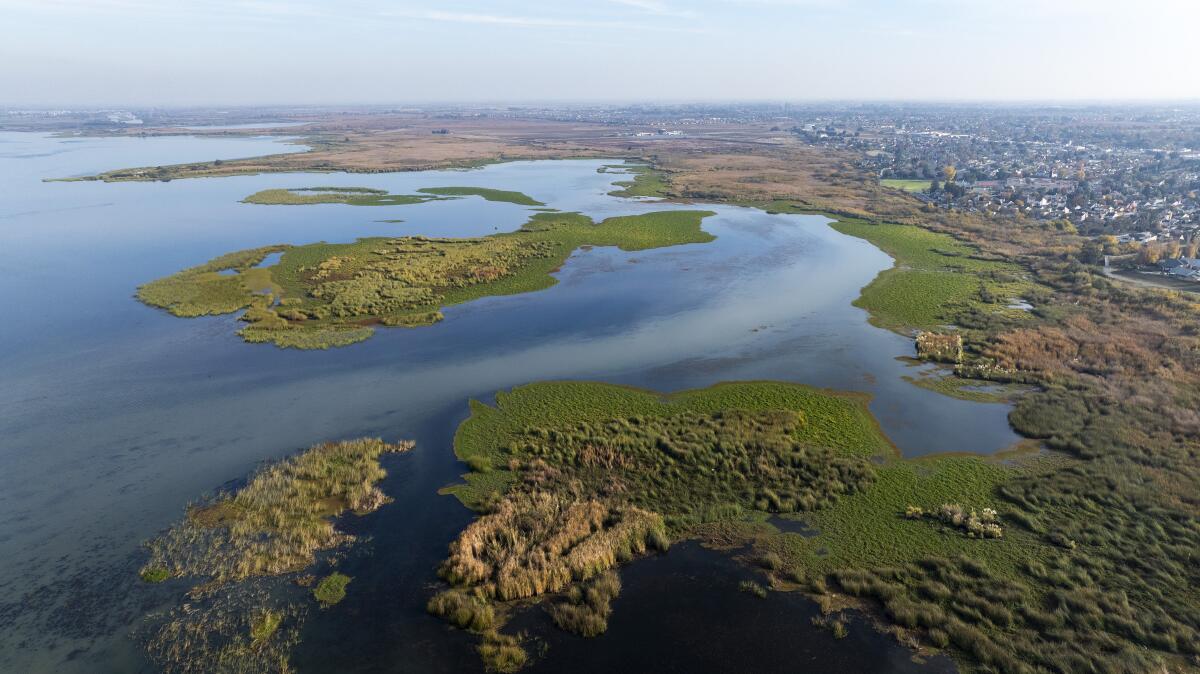There are few government agencies more central to daily life in Los Angeles than the Metropolitan Water District of Southern California, which spends billions of dollars each year ensuring that 19 million people have enough to drink, in part by importing hundreds of billions of gallons from the Colorado River and Northern California.
There are also few agencies more prone to bitter power struggles.
The latest drama could reach a tipping point Monday, when Metropolitan’s board will consider firing the agency’s general manager — with potentially huge consequences for our water supplies, depending on whom you ask.
Newsletter
You’re reading Boiling Point
Sammy Roth gets you up to speed on climate change, energy and the environment. Sign up to get it in your inbox twice a week.
You may occasionally receive promotional content from the Los Angeles Times.
But is this a story about a bad boss, mistreating employees of an agency previously rocked by sexual harassment allegations? Or is it yet another water conspiracy in a region with a long history of schemers and plunderers?
Over the last week, I’ve interviewed more than half a dozen people familiar with the details of the water district’s multiple investigations into Adel Hagekhalil — none of them willing to be named or quoted. It’s difficult for me to say with certainty whether Hagekhalil did anything wrong — or whether his possible ouster from Metropolitan is the product of a plot to reverse his climate-friendly policy priorities, as environmental groups allege.
But I do feel confident saying a few things.
First some background on Metropolitan, whose 12-story office tower looms over Union Station.
Our story begins in 2021, when the agency hired Hagekhalil, then an official at L.A. City Hall. The board vote was razor thin, with Mayor Eric Garcetti’s Metropolitan appointees supporting Hagekhalil. They hoped he would shift the agency’s focus from imported water — which has become increasingly unreliable as rising temperatures dry out rivers and snowpack — to more dependable local sources, such as recycling, stormwater and groundwater.
Hagekhalil’s selection was opposed by some Orange County and Inland Empire officials. They’re not against local water or conservation. But they’re more open to big infrastructure projects loathed by environmentalists, such as Gov. Gavin Newsom’s proposed $20-billion water tunnel beneath NorCal’s Sacramento-San Joaquin River Delta.
So when Hagekhalil was accused by a Metropolitan staffer of harassment — after which the board placed him on administrative leave in June — it’s perhaps no surprise that environmental activists smelled a conspiracy.
Were the same water districts that tried to block Hagekhalil the first time making another power play, possibly to build support for the Delta tunnel and other big infrastructure projects? Were the accusations against Hagekhalil — which I’ll address in more detail shortly — completely made up, or at least being blown out of proportion?

Adel Hagekhalil speaks at Weymouth Water Treatment Plant in La Verne.
(Brian van der Brug / Los Angeles Times)
As a journalist, I usually dismiss conspiracy theories.
But this is California water politics. Modern-day Los Angeles wouldn’t exist if not for the early-1900s Owens Valley water grab, in which city agents posing as ranchers and farmers quietly bought up land hundreds of miles away.
So when environmentalists cried foul over the accusations against Hagekhalil, I took them seriously — especially considering that Metropolitan’s chief financial officer, Katano Kasaine, who said in a letter to the board that she’d been “sidelined, bullied, harassed, and disrespected” by the general manager, also happens to serve as treasurer of the Delta Conveyance Design and Construction Authority, the agency created to finance Newsom’s tunnel.
Before we continue, a little background on the $20-billion tunnel.
The 45-mile passageway would make it easier to transport water from Northern California rivers to Central Valley farms and Southern California cities. Although state officials say they would use the tunnel primarily during wet periods, when there’s enough water to go around, activists worry that environmental standards would ultimately be ignored, draining rivers and wetlands of water needed to support endangered fish and healthy ecosystems.
Although Hagekhalil hasn’t come out for or against the tunnel, he’s taken a far more cautious approach than his longtime predecessor, staunch tunnel supporter and water power broker Jeff Kightlinger. It’s not yet clear if the agency’s board will vote to spend billions of dollars to finance the tunnel — money that would ultimately be paid by residents of Los Angeles, Santa Monica, San Diego County and other Metropolitan member districts.
So I understand why anti-tunnel advocates are concerned — especially with Kightlinger still looming. The former general manager continues to consult on Metropolitan matters for four of the water agency’s members, including the city of Pasadena. All four of those members opposed Hagekhalil’s selection three years ago.
Between Kightlinger and Kasaine, it sounds like “Chinatown, Part 2.”
But I’ve become convinced that’s not the case.

Estuary islands on Big Break, a small bay on the San Joaquin River. Environmental activists fear the river’s delta would be harmed by a proposed $20-billion tunnel.
(Brian van der Brug / Los Angeles Times)
If this is a coup to build the Delta tunnel, it’s happening too early; a final vote to fund the project is several years away. It’s also hard to imagine Metropolitan totally reverting to pre-Hagekhalil status quo, when giant aqueducts ruled the day and locally sourced water was an afterthought. Just last week, the board unanimously reelected as its chair Adán Ortega Jr., who supported Hagekhalil in 2021 and has made climate adaptation a top priority.
Ortega sounds confident that the agency’s agenda isn’t changing — with or without Hagekhalil.
“Our task at hand is tackling climate change,” the board chair told my colleague Ian James this summer. “Anybody that would challenge that is up against a pretty embedded policy framework for tackling climate change.”
I hope Ortega is right. But I fear he may be overconfident.
Because even if there’s no coup at Metropolitan, there’s something shady going on.
That much should be clear from some of the allegations leveled at Hagekhalil.
Although Kasaine’s leaked letter has received most of the public attention, I’m told other staffers have aired their own concerns, some of them utterly frivolous, including that Hagekhalil asked an employee to get him water, and that he said he wanted to resolve disputes without litigation — somehow a swipe at Metropolitan’s legal team.
Indeed, everyone I interviewed agreed that Hagekhalil almost certainly hasn’t done much to mistreat people who work for him. The only accusation I’ve heard that involves legitimately bad behavior, and which Hagekhalil denies, is that he kissed a female employee on the top of her head, as an apology for one of his supposed misdeeds.
So if there’s no grand master plan to oust Hagekhalil, why all the allegations and intrigue?
I think it comes down to power and control. With a strong sprinkling of water policy.
What really seems to have infuriated Metropolitan board members and staffers who never liked Hagekhalil isn’t that he’s got a bullying personality (which by most accounts he absolutely does not), or that he’s tried to subvert the Delta tunnel (which thus far he has not). It’s that he’s circumvented the agency’s traditional power structures, hiring his own top staffers and consultants, many of whom have previous ties to Los Angeles city government.
In Kasaine’s letter to the board, she called Hagekhalil’s inner circle a “shadow leadership team.”
Probably not coincidentally, the general manager’s top hires have helped lead Metropolitan’s climate adaptation planning process, designed to study alternatives to Colorado River and Northern California water supplies.
“Many of us believe this project is leading to an epic failure,” Kasaine wrote.

Metropolitan Water District headquarters in downtown Los Angeles.
(Al Seib / Los Angeles Times)
Again, I don’t see much evidence of an Owens Valley-style water grab. That said, the Metropolitan leaders most frustrated by Hagekhalil’s leadership are the same leaders who, historically, have preferred to keep buying large gobs of water from distant rivers. Yes, they’re now (mostly) sold on more robust local supplies. But they’d still be happy to depose a general manager whose underlying vision has never quite lined up with theirs.
Also worth noting: This isn’t the first time spurious accusations have been used against Hagekhalil.
After the Metropolitan board voted to hire him in 2021, but before it finalized his contract, information about two lawsuits against the city of L.A.’s sanitation department — one of his previous employers — was sent to the board at the request of an Orange County water official, part of a ludicrous fishing expedition to derail his candidacy.
It didn’t work. A labor union representing more than 10,000 L.A. city employees wrote to the Metropolitan board, calling Hagekhalil an “exemplary leader” who “worked to build a culture of inclusion, respect, and fairness.”
Yes, at Metropolitan, Hagekhalil has seemingly sidestepped some senior staffers, fomenting mistrust.
But he’s left those staffers largely in place. And he arguably had no choice but to bring in some of his own people, given the policy differences fracturing the agency — differences that could determine SoCal’s water future.
So what happens next?
In theory, the agency’s board could vote to fire Hagekhalil — or reinstate him, or extend his leave — at a meeting scheduled this Monday. In practice, I’m hearing rumblings that a dismissal is unlikely, given that the investigation into Kasaine’s allegations isn’t yet finished. A delay sounds ideal. It’s not clear whether there’s any good reason to fire Hagekhalil; doing so at this point, while a key investigation is ongoing, would be malpractice.
Beyond Monday, there’s one person who could help sway the outcome.

Mayor Karen Bass speaks at a press conference at the Port of Los Angeles in March, alongside Michael Regan, second from left, head of the U.S. Environmental Protection Agency.
(Genaro Molina / Los Angeles Times)
That would be L.A. Mayor Karen Bass. Although she’s largely declined to engage personally in environmental and climate policy — leaving that work to her lieutenants — water is an issue of supreme importance to her millions of constituents. The L.A. Department of Water and Power gets about half of its water from Metropolitan.
What’s more, Bass appoints five of Metropolitan’s 38 board members — and under the agency’s weighted voting system, in which bigger cities have a bigger say, those directors can wield a lot of power. Especially if Bass were to team up with Metropolitan’s San Diego contingent — which worked with the L.A. bloc to install Hagekhalil in 2021 — she could place an outsize role in determining the general manager’s fate. Or in choosing his replacement.
But it’s hard to know if Bass is even paying attention. My request for comment to the mayor’s office — asking if Bass is following the situation at Metropolitan, and if so what she’s doing about it — yielded no response.
That’s a shame, because the climate crisis is getting worse. The American West is getting drier. Ensuring Southern Californians have enough water to drink and bathe and thrive is a defining challenge of the 21st century.
Bass needs to stop hiding from the chaos at Metropolitan and start showing leadership. This means assuring the public that she cares, and that she’s going to play a role in holding the agency to its climate commitments.
This is the latest edition of Boiling Point, a newsletter about climate change and the environment in the American West. Sign up here to get it in your inbox. Or open the newsletter in your web browser here.
For more climate and environment news, follow @Sammy_Roth on X.


